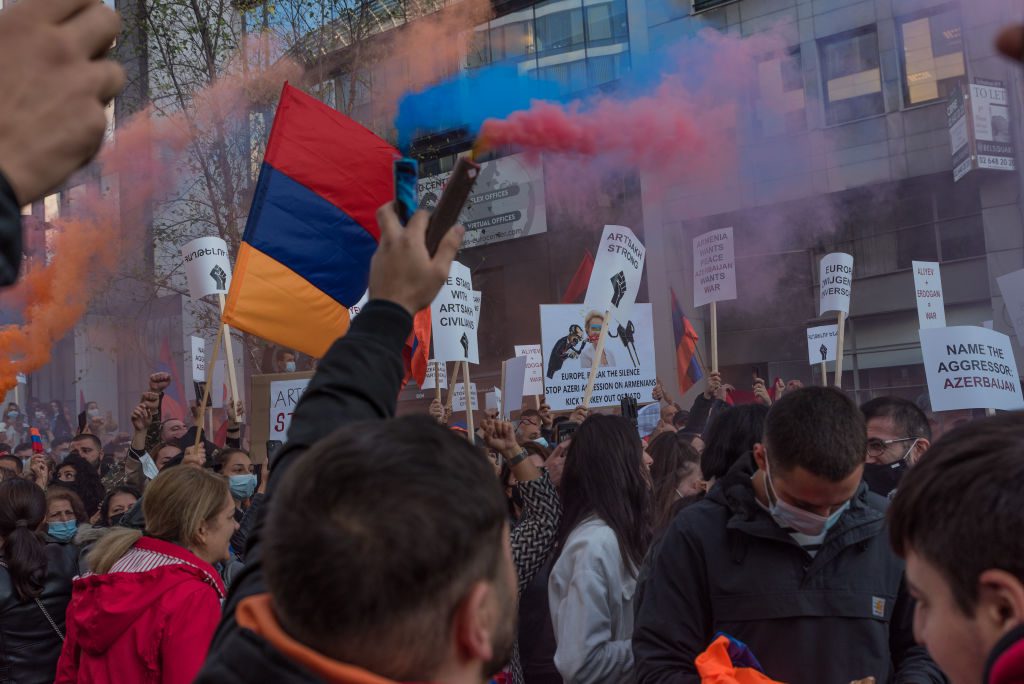How America Helped Create the Conflict in the South Caucasus

On September 27, almost certainly as a result of an offensive by the Azerbaijani army, hostilities resumed between two old foes in South Caucasus, Armenia and Azerbaijan. Both sides are at loggerheads over a mountainous region of Nagorno-Karabakh—internationally recognized as part of Azerbaijan but under de facto Armenian control since the early 1990s, as are a number of adjacent Azerbaijani territories. In the dying days of the Soviet Union, both sides engaged in a bloody war. The conflict was suspended after a precarious, Moscow-mediated ceasefire in 1994, but it’s festered ever since. It was only a matter of time as to when it would erupt again.
The conflict has local drivers, and the primary responsibility for its endurance, without any doubt, lies with local political elites. However, the United States, in the heyday of its post-Cold War unipolar moment, when it felt empowered to engage just about every conflict around the world, made a number of choices that rendered the resolution of the Nagorno-Karabakh conflict more difficult.
When the South Caucasus nations emerged as independent states following the demise of the Soviet Union in 1991, Washington’s policy priorities included their swift integration into the U.S.-led liberal world order, bringing their energy riches to global markets, promoting Turkey as a regional model of a secular and pro-Western state, and excluding post-Soviet Russia, and especially Iran, from the regional integration projects. These choices ignored the historical and cultural realities of the region and failed to take into account their possible impact on the Nagorno-Karabakh conflict.
Exhibit A of such ignorance was the decision to marginalize Iran, despite its longstanding ties with both Armenians and Azerbaijanis. This reflected a feature of U.S. foreign policy: single-minded fixation on excluding and isolating Iran in all possible scenarios. While there is a case for containing Iran in the Levant, where it threatens Israel, South Caucasus represents a completely different strategic landscape.
Contrary to what could be expected from a militant Shiite republic, Iran did not align itself with its Azerbaijani co-religionists in the Nagorno-Karabakh conflict, but sought to mediate between Azerbaijan and Armenia instead. Yet despite that, Iran was not invited to join the Minsk Group, tasked by the Organization of Security and Cooperation in Europe (OSCE) with conflict resolution. The exclusion of Iran was all the more puzzling as it happened during the presidency of Ali Akbar Hashemi-Rafsanjani, who pragmatically sought to reach out to the U.S. While many American diplomats deserve credit for their good faith efforts at understanding and resolving the conflict, the policy guidelines were issued in Washington, where enmity towards Iran was deeply entrenched.
The U.S., by contrast, wholeheartedly encouraged Turkey’s involvement in the South Caucasus, seen at the time as a useful antidote to the “Islamic fundamentalism” supposedly emanating from Iran. Yet unlike Iran, Turkey from the outset had sided unambiguously with its Azerbaijani brethren. Save for a brief attempt in 2009, it never tried to establish diplomatic relations with Armenia and kept its border with that country closed in solidarity with Baku. As the Turkish leader Recep Tayyip Erdogan grew more authoritarian and nationalist at home, he developed an appetite for expansionism abroad. He used his alliance with Azerbaijan for Turkish power projection in South Caucasus. And Azerbaijan was happy to oblige as Turkey supported its latest military offensive.
More ominously, this Turkish-Azerbaijani convergence is having a long-lasting impact on Azerbaijani society that will make regional reconciliation more difficult. In the early 2010s, officials in Baku started framing the whole Armenian ethnicity, as opposed to only fighters in Nagorno-Karabakh, as enemies of “Turkic peoples.” Ankara not only did nothing to convince its ally to drop such inflammatory rhetoric, but by offering Baku unconditional support, encouraged it. Credible reports about Turkey mobilizing Sunni extremist fighters from Syria in support of Azerbaijan risk exposing and deepening cleavages in Azerbaijani society itself, which is Shiite in its majority. Ironically, while U.S. sought to contain an Islamist threat from Iran, by excessively favoring Turkey, it may have helped to open the gates for a much more predatory and virulent form of Islamism.
Counterfactuals are difficult, and one can only speculate as to how the history of the South Caucasus would have evolved over the last 30 years had the U.S. made different choices at the time. It is quite possible that even with greater Iranian involvement and a more modest Turkish role the outcome would still have been a stalemate with periodic bloody eruptions. What is indisputable, however, is that Washington’s preferences in the region did not usher in greater security and stability.
It does not have to follow that the only wise course correction for the U.S. would be to disengage from the region completely, which is what the Trump administration appears to be doing. Among all the major players, the U.S. was the last one to express concern over the fighting, though America is still, alongside France and Russia, an official OSCE mediator on Nagorno-Karabakh. However, Washington should rethink its priorities and clearly distance itself from a Turkey that pursues an agenda that has nothing to do with American interests. The U.S. can still play a useful role in South Caucasus. For that, it should set its anti-Iranian obsessions aside and marshal a broad, multilateral effort to stop the armed conflict in the region before it spirals out of control.
Eldar Mamedov is a political adviser to the Progressive Alliance of Socialists & Democrats in the European Parliament. This article reflects his personal views and not necessarily the opinions of the S&D Group and the European Parliament.